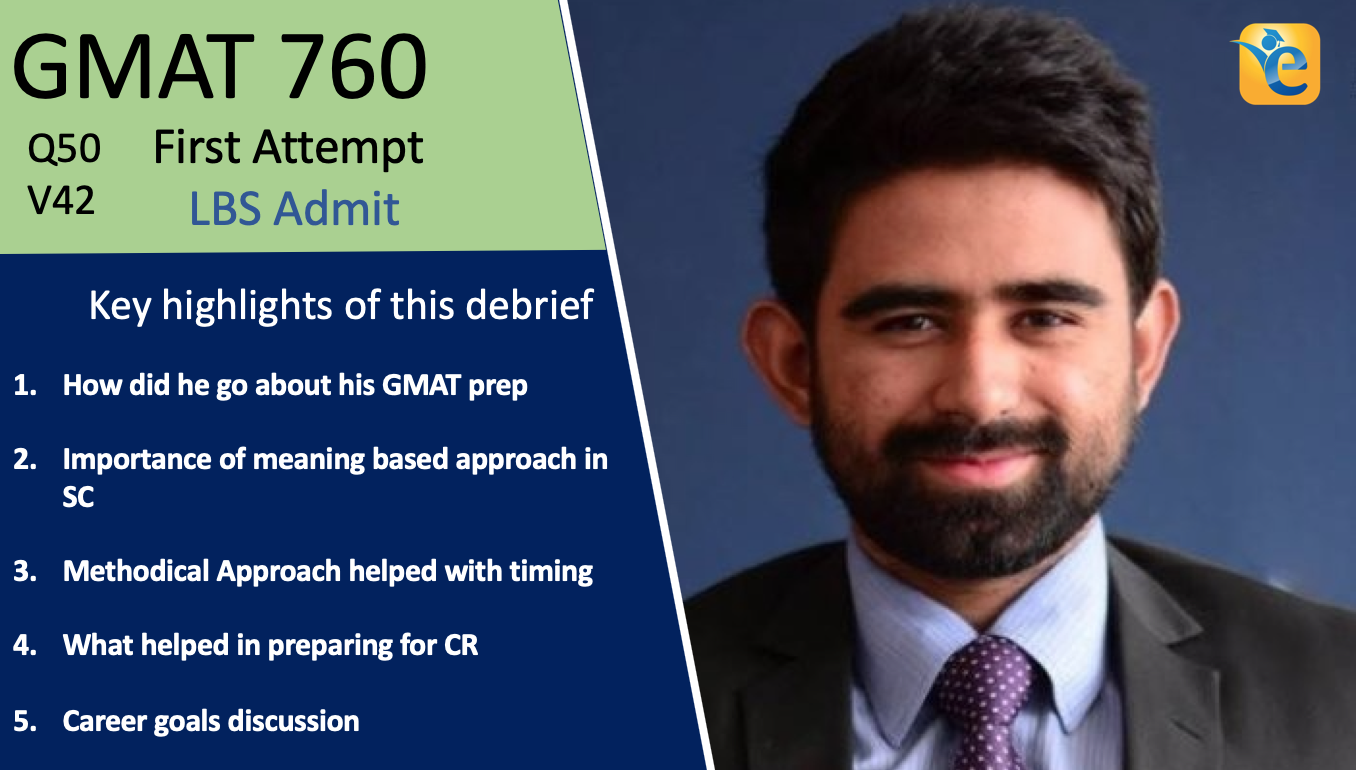“Success means having the courage, the determination, and the will to become the person you believe you were meant to be” – George A. Sheehan
Shahmeer always believed that he was always meant to be someone more than just a normal engineering graduate. In order to realize his true potential, he had to get better international exposure which led him to prepare for the GMAT. He managed to score a 760 on the GMAT on his first attempt. Read on or watch the video to see how he achieved an amazing score of 760 while doing his undergraduate studies.
Rajat: Congratulations on scoring an amazing score of 760. Let’s talk a bit about your preparation. When did you start preparing for the GMAT?
Shahmeer: I started preparing for GMAT in October as I was already planning to do an MiM program right after my graduation. I had decided upon a few target colleges where I wanted to get into. In the beginning, when I used to study only during the weekends, I gave a mock test on Veritas and scored a 550. I was taken back as I had to score north of 650 to have even a fighting chance to get into my target colleges.
Did you know a GMAT score of 730+ yields incremental $500K in ROI? Start your GMAT Preparation by Signing up for our FREE Trial and get access to FREE online GMAT preparation resources. We are the most reviewed GMAT preparation company on GMATClub with more than 1870 reviews.
How did I go about my GMAT preparation

In December, I gave another GMAT prep test and scored a 620 in that. I realized that I am getting nowhere near my target score which made me leave the part-time job that I was doing along with my graduation.
In February I attended e-GMAT’s seminar on ‘How to score a 760 in GMAT’ in which you discussed score plateau and how to get across it. After this, I prepared for 8 to 10 hours daily in the month of February. But by the end of the month, I became so exhausted that I almost gave up on my GMAT dream and started attending recruitment sessions.
Before beginning my course, I gave a mock test and scored a 640 and didn’t give a mock test for another 3 months. If I had to attend the next academic session, I had to give the GMAT exam in the first week of May. So, I worked rigorously in March and covered a lot of topics which helped me get to the practice questions really fast. In the month of April, I decided to do 5 official questions of each type daily and followed this routine religiously. Before starting e-GMAT’s course, I used to get an ability level of 60 in SC which transformed to 93 after the completion of the course. In the last week of the month, I gave another mock test and scored a 670.
Although I scored a 700 in a GMAT prep test that I gave 3 days from that, my Quant score was very low at Q44 even though I had a good score in Verbal with V41. Two days from this I gave another test in which I scored a Q50, but my Verbal score fell to V32. I panicked as it was two days before my GMAT exam. I believed that I could score north of 700 but I was uncertain about this as I had never scored more than 700 in any mock tests. But eventually everything went well on the day of the test and I could score a 760.
Rajat: You could score your best split scores that you had achieved till now in the final exam. How was the score split initially when you were scoring around 620 to 640? Also, you have gone through the master comprehension section entirely. What did you learn from there?
How to tackle RC questions

Shahmeer: When I scored 620, my split scores where V29 and Q46 and for 640 it was Q45 and V33. The most important thing that I learned during my GMAT preparation was that if I am reading a passage, I should not read it just for the sake of giving the GMAT exam, rather I should take some knowledge out of the activity.
This helped me a lot by transforming RC from my weakest to strongest section. The meaning-based approach helped a lot in SC as I never really read the entire question at first. After being familiar with the approach, it became easier for me as I could eliminate most of the options compared to my previous situation.
Due to my premedical background, I found it very tough to get a good score in Quant. But the questions that e-GMAT’s course provided me were so hard that I found it very easy to solve even the toughest problems in the main exam. Even though I never scored a high ability level in quant I could score a Q50 in the main exam just because of the level of questions in e-GMAT’s course.
Another advantage I got by doing the mock tests was that I managed to answer all the questions before the stipulated time. This helped me during the main exam as I was a bit slow to start the Quant section, but I could finish doing all the questions with two minutes to spare. Having a methodical approach as suggested by e-GMAT helped me in that circumstance.
Rajat: How did you prepare for the CR questions. Did you follow the pre-thinking approach for CR?
Preparation for CR
Shahmeer: I was pretty good at CR before I started e-GMAT’s course and it was my best section. But as my focus shifted more to SC and RC, my best section became my worst section. Therefore, I had to go through all the questions in the CR section of e-GMAT so that I could bring back the accuracy that I earlier had.
e-GMAT’s course helped me to differentiate between an intermediate conclusion, conclusion and an argument supporting a conclusion which made solving CR questions much easier. I also did a lot of questions from Scholaranium and the official guide which kept me up to date on the topics.
Rajat: Let us talk about the preparation that you did in the month of April when you were solving 5 questions from every section on each day. How did you solve those 5 questions?

Shahmeer: PS had more questions than the other sections. So, I did 7 to 8 questions of PS, 4 to 5 questions of DS, 4 questions of CR and so on.
I used to go through the rules and solved these questions for an hour and a half daily. After that, I used to go through the solutions so that I could see how to answer the questions that I was unable to answer and understand the methodical approach that was followed for even the questions that I had answered.
While I was practicing RC questions, sometimes I took 4 minutes and sometimes 7 minutes to read the whole passage. But I was not bothered about this because I was confident that I could compensate this in other sections like CR. This confidence helped me correct my approach towards different questions and I started following a methodical approach that helped me in the long run.
Rajat: I would appreciate you for following the methodical approach as in my experience, people who have scored big had always done that. Regarding your admissions, why did you choose the University of Mannheim for your MiM?
Career Goals

Shahmeer: I have done a variety of internships in diverse profiles in different organizations ranging from a tech-based start-up to the Central Bank of Pakistan.
I had always thought that I could realize my potential somewhere outside Pakistan and a MiM was one of the most efficient ways to do that as it would improve my international employability also.
Mannheim was one of the most affordable schools that I could find which would help me achieve my goals.
I was also interested in the programs of St. Gallen and HEC Paris, but the overall cost was out of my budget. Although St Gallen had a fee of 3700 francs per semester which I could’ve afforded, the living expenses for two years would amount to USD 50,000 which would be far out of my budget.
In Mannheim, I could complete my degree in around 20,000 euros which would be well inside my budget of USD 25,000. I am also interested in the double degree program in which one year of study will be in Mannheim and the second year will be in ESSEC, France.
Admission at top US business schools
Rajat: As you have an amazing score, you can use it to your leverage to avail a scholarship from these universities if they are providing one. Another thing I would recommend you is to work while studying which was what I did during my education. Even though you might not have a very big chance at Harvard or Stanford due to your lack of work experience, there are many good schools especially in Canada where you have good chances of getting a PR as well.
Shahmeer: I am not eligible to apply to any US business schools as I have not yet completed my graduation. I am planning to go for a master’s degree now, build up my profile, do a couple of international internships and then apply to the top 10 business schools as the score will be valid for another 5 years.
Also, I wanted some advice regarding my GPA. I have a 3.3 which would be improved to 3.42 after the addition of the last semester marks. Is it worth it to retake the summer semester exams to improve my GPA to 3.5?
Rajat: I don’t really think that your GPA would hold you back from securing an admission anywhere because what you do before using your GMAT score the second time will matter slightly more than even your GMAT score.















